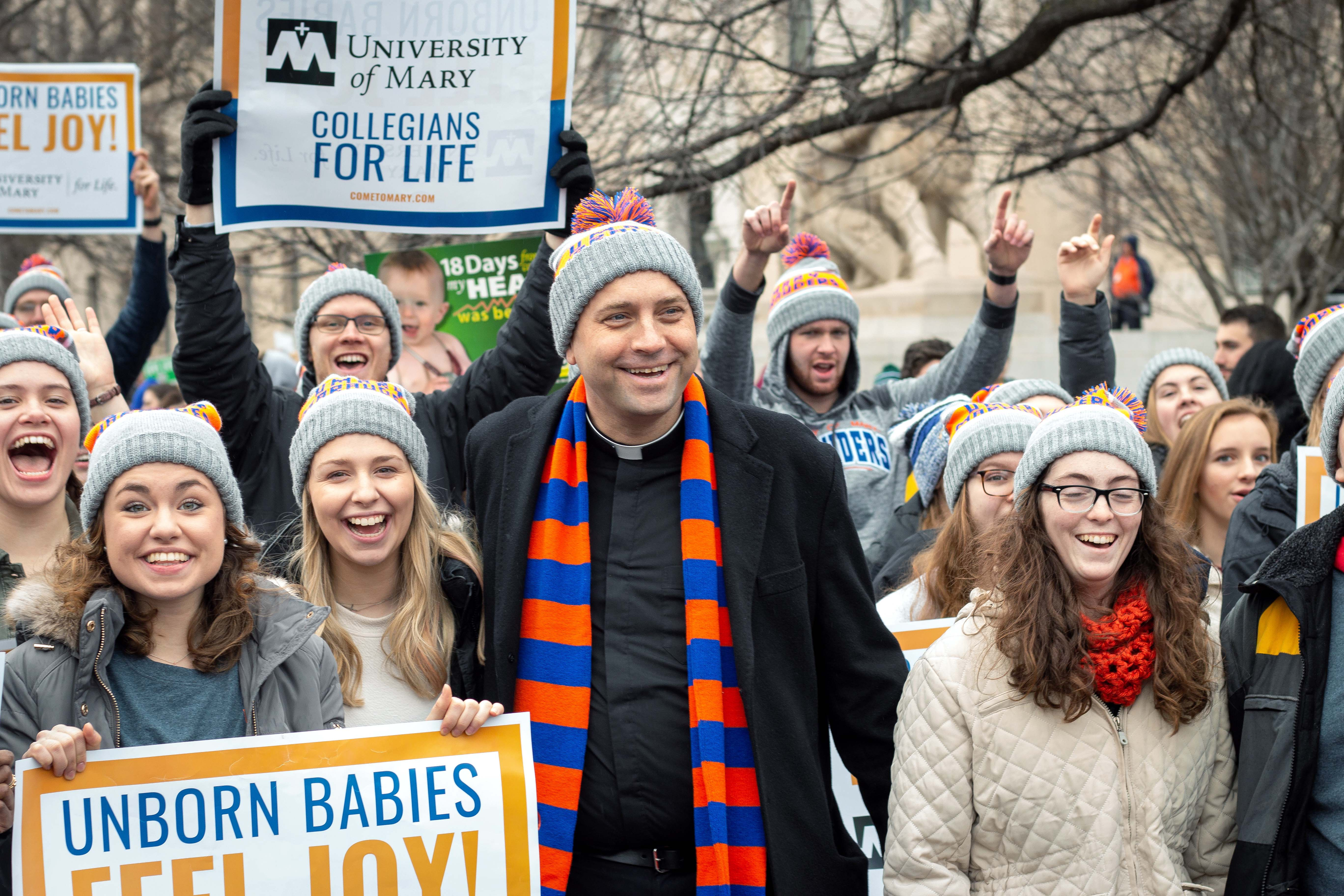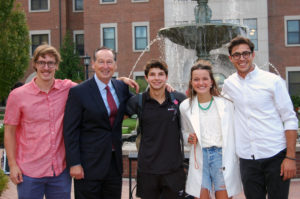
Msgr. James Shea, president of the University of Mary, leads his students during the January 2020 March for LIfe in Washington, D.C. UNIVERSITY OF MARY
News
Catholic colleges and universities educate the whole person
September 21, 2021
What makes a Catholic college or university Catholic? Is it more than the presence of a campus church or chapel, a theology requirement within the curriculum, and the presence of priests or religious faculty?
And what makes it worth the extra cost compared with that of a public institution?
According to the presidents of two Midwest schools, the value proposition of Catholic higher education involves a Catholic culture where students can pursue the fullness of truth while being formed in their spiritual lives and educated for a career.
St. Pope John Paul II wrote in his 1990 apostolic letter on Catholic universities “Ex Corde Ecclesiae”: “Without in any way neglecting the acquisition of useful knowledge, a Catholic University is distinguished by its free search for the whole truth about nature, man and God. … It is in the context of the impartial search for truth that the relationship between faith and reason is brought to light and meaning.”
In the document, he also wrote: “In a Catholic University, therefore, Catholic ideals, attitudes and principles penetrate and inform university activities in accordance with the proper nature and autonomy of these activities. In a word, being both a University and Catholic, it must be a community of scholars representing various branches of human knowledge, and an academic institution in which Catholicism is vital, present and operative.”
MAKING FAITH PRESENT
For Stephen Minnis, president of Benedictine College in Atchison, Kansas, making that vision a reality involves creating an immersive Catholic environment for students.
“The Catholic faith permeates everything that we do,” he said.

Stephen Minnis, president, second from left, is pictured with several students at Benedictine College. BENEDICTINE COLLEGE
“No matter where our students are, whether they’re in the dorm, the classroom, church, on the playing field, in the dining hall, on the sidewalk, we as an institution have a commitment to educate them within a community of faith and scholarship.”
With the availability of daily Mass, confession, eucharistic adoration, prayer services, plentiful religious art, and chapels currently being built in every dormitory, Benedictine works to make the Catholic faith present and accessible to students.
“We, as humans, will always worship something,” Minnis said. “And if we don’t provide them an opportunity in every aspect of our college for them to worship God, they will find something else to worship – whether it’s the internet, social media, pornography or video games.”
COST DIFFERENTIAL
But that immersive environment comes with a cost.
According to the College Board’s report, “Trends in Pricing and Student Aid 2020,” on average, private undergraduate tuition was 3.5 times that of public institutions during the 2020-2021 academic year – $37,650 compared with $10,560. Factoring in room and board, Catholic colleges cost 2.3 times that of public education – $50,770 compared with $22,180.
Given the higher costs, many Catholic colleges offer generous financial aid to help make Catholic education more affordable.
For example, Msgr. James Shea, president of the University of Mary in Bismarck, North Dakota, touts his school as one of the most affordable four-year Catholic universities in the United States.
“No student comes to the University of Mary without receiving a scholarship of some kind,” he said. Those include academic scholarships and need-based financial aid, resulting in an average tuition cost to students and their families of $17,000 per year.
And graduates of Catholic high schools can benefit from University of Mary’s Catholic Scholars Program, Msgr. Shea said.
“If you’ve made the sacrifice to send your daughter or your son to Catholic high school, we wanted to honor that and make sure that if they came to the University of Mary … that we’re going to give them free room and board as the minimum institutional aid.”
NEWMAN CENTERS
For some Catholic families, paying the cost of private college still remains out of reach, but Catholic ministries such as Newman Centers, which offer opportunities for daily Mass, Bible studies, retreats, mission trips and Catholic fellowship, can reassure parents of a faith presence at a public college or university.
Jenny Medinger of Lincoln said she expects her son, Simon, a freshman at the University of Nebraska at Omaha (UNO), to find nourishment for his faith while living in the residence hall at the St. John Paul II Newman Center.
“It was unmistakable the feeling he and I got when we came and toured the residence hall, and we just knew right away that he belonged there.”
It was a “sharp contrast” to the campus tour at UNO, where a more secular atmosphere prevails, she said.
In addition to visual reminders of the Catholic faith, such as posters and crucifixes in the residence hall, “their (tour guides’) kindness and their welcoming attitude (made a difference) … it was just the Holy Spirit that did the rest.”
“We’ve never encouraged our children to live in a Catholic bubble, and we’ve always exposed them to the world around them,” Medinger said. “But we know the importance of them having a safe place to express their faith and their beliefs without fear of retribution.”
‘HOLISTIC EDUCATION’
While praising the work done by Newman Centers at public institutions, Msgr. Shea said Catholic institutions can make the faith present, not only through faith formation activities, but as a regular element of academics as well.
“We’re deeply committed to the holistic education of the human person,” he said. “We’re intent upon good Catholic formation while at the same time committing to excellence in technical training and career preparation.”
Msgr. Shea cited his school’s top-rated nursing program as an example.
“There’s great technical education, technical excellence there, but we’re able to do something, which I tell you for sure, that secular nursing education isn’t able to offer, which is the ethical formation necessary … to think carefully about the life and dignity of the human person, the sanctity of life from conception to natural death and what it means to have moral reasoning, and not just political sentiment, about these hot button issues.”
Benedictine President Minnis brought up Pope Benedict XVI’s description of the difference between public and Catholic colleges and universities during a 2008 meeting with college administrators.
“He said, the difference between public institutions and Catholic institutions is that public institutions have the duty to inform the intellect, (but) Catholic institutions have the duty, not only to inform the intellect, but to inform the will, and have a duty to love (their) students. That’s the difference, and that’s our difference too.
“If you truly love your students, then you’re going to do whatever you can to form them within the (Catholic) mission and educate them in a proper way,” Minnis said.